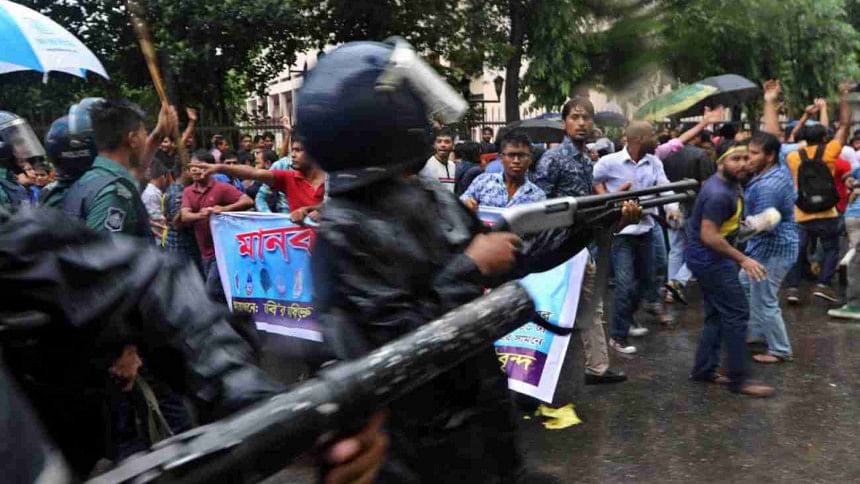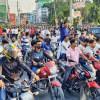Compromising freedom of assembly

The state of Bangladesh appears to be clamping down on its active citizens. Almost every month, we are coming across reports of police excesses against protesting students, civil society members, rights activists and opposition leaders. Most involve policemen wielding batons, lobbing tear gas shells, or using water cannons and armoured vehicles to disperse the demonstrators, which prompts one to ask if freedom of assembly has been obliterated from the charter of freedoms that the Bangladesh Constitution guarantees to its citizens.
On January 26 this year, hundreds of environmental activists participated in a demonstration organised by the National Committee to Protect Oil, Gas, Mineral Resources, Power and Ports, in the capital's Shahbag area, demanding relocation of the coal-fired Rampal power station near the Sundarbans. The protest quickly escalated when security forces confronted the activists, leading to clashes and use of teargas, rubber bullets and water cannons. Eyewitnesses claimed several dozen rounds of tear gas shells were fired to quell the situation. Five activists of the pro-left civil society group were detained from the scene.
There were also instances of police taking action to prevent protests from taking place at all. On February 25, 2017 environmental activists were prohibited from organising a sit-in protest in the port city of Chittagong. In response, the activists gathered in front of Chittagong Press Club and held a rally instead. According to media reports, five of them were injured when police officials charged at them with batons. Later, in July, an indoor meeting of the National Committee in Khulna was also thwarted.
The frequent use of excessive force by security officials has become a serious impediment to the exercise of the right to peaceful assembly. On February 28, a citizens' protest against increased petrol prices in Dhaka was met with tear gas shells and water cannons injuring 20 people. On May 28, police came down heavily on protesters opposing the relocation of a statue on the Supreme Court premises in Dhaka.
"A close reading of the law reinforces the argument that by preventing a demonstration from going ahead, taking steps in advance of a demonstration to disrupt it, halting a demonstration, and by storing personal information on people because of their involvement in a demonstration, the state authorities unduly interfere with citizens' right to protest.
Two separate events in Dhaka last month further show the heavy-handed approach adopted by the current administration. On July 14, police intervened in an informal meeting held at the private residence of a political leader in Uttara. Among the participants was a former president of the country, as well as lawyers, prominent political and civil society leaders. The host was advised by the security personnel not to hold any meeting at his place. The duty officer of the local police station, however, denied knowledge of the incident although media reports mentioned the presence of police vans outside the venue of the meeting.
On July 21, police charged batons and lobbed tear gas canisters to disperse a demonstration of students who gathered to demand the announcement of their exam schedules. Four students were injured, including one who sustained serious eye injuries. While video footage clearly establishes the fact that Siddiqur Rahman fell victim to direct hurling of a tear gas canister by police personnel, Dhaka Metropolitan Police chief claimed that he might have been hurt by a heavy object thrown by his fellow protesters. Later, police filed a case against around 1,200 unnamed students of seven government colleges on charges of "attempting to kill policemen, rioting with lethal weapons and damaging property". The charge of attempted murder in such a case appears to be far-fetched and in all likelihood constitutes "abuse of procedure" by the members of the security force.
Police actions in the scenarios elaborated above are justified on grounds of "national security" and "maintaining public order". Perhaps the time has come for the political leadership to assess whether such actions are in conformity with the country's international obligations and with the laws of the land. Article 20(1) of the Universal Declaration of Human Rights stipulates that "everyone has the right to freedom of peaceful assembly and association". Likewise, Article 21 of the International Covenant on Civil and Political Rights notes that "The right to peaceful assembly shall be recognised".
Article 37 of Bangladesh Constitution stipulates that "every citizen shall have the right to assemble and to participate in public meetings and processions peacefully and without arms…" The article protects the rights of Bangladeshis to protest by holding meetings and demonstrations with other people.
This right to assembly is closely tied up with the right to freedom of expression. Public meetings, demonstrations, protest marches, sit-ins, motionless protests and press conferences are means of public expression and constitute one of the foundations of a democratic society. Quite justifiably, the right applies to peaceful gatherings and does not protect "intentionally violent protest".
One may argue, while the right to assembly is not an absolute right as it is "subject to any reasonable restrictions imposed by law in the interests of public order and public health" (Article 37 of the Bangladesh Constitution), it also imposes strict conditions on the state authorities to demonstrate that their action is lawful, necessary and proportionate. An action is "proportionate" as long as "it is appropriate and no more than necessary to address the issue concerned". Thus, a close reading of the law reinforces the argument that by preventing a demonstration from going ahead, taking steps in advance of a demonstration to disrupt it, halting a demonstration, and by storing personal information on people because of their involvement in a demonstration, the state authorities unduly interfere with citizens' right to protest.
In a democratic polity, the right to peaceful assembly cannot be impeded simply because the protesters may hold a view contrary to those who are in control of the state or it is likely to be inconvenient or there might be heated exchange between opposing groups. There is little scope to dispute that "(t)here is a positive obligation on the State to take reasonable steps to facilitate the right to freedom of assembly, and to protect participants in peaceful demonstrations from disruption by others".
One of the aggrieved guests at the Uttara dinner fiasco, Gono Forum leader and senior advocate Subrata Chowdhury, raised a pertinent question: "You [government] are not letting us sit at home or on the field, and march or rally on the street on the issues of people's sufferings. You are snatching away our banners and charging batons. What kind of politics is this?"
Would someone from the administration please care to respond?
C R Abrar teaches International Relations at Dhaka University. He writes on migration and rights issues.









Comments